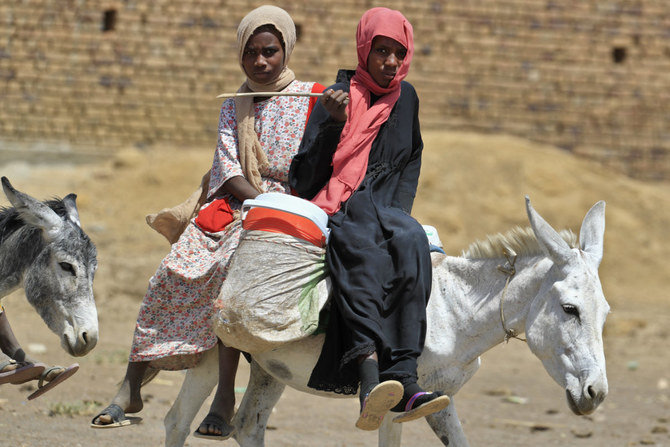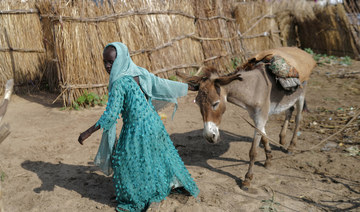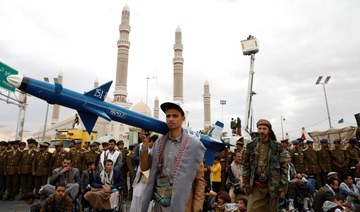WAD MADANI, Sudan: Desperate to check on her elderly mother amid the chaos of Sudan’s war, Amal Hassan left her family home in the capital Khartoum on May 30.
She has yet to return.
Her husband and three children in Omdurman — part of greater Khartoum — are among the hundreds of Sudanese families desperate for news of loved ones who have disappeared.
At least 3,900 people have been killed since war broke out in mid-April between the army and the paramilitary Rapid Support Forces (RSF).
Hundreds more have simply vanished, leaving their families anxiously guessing whether they have died in the fighting or been abducted by combatants.
Many anxious families have turned to social media, desperate for news of missing relatives, in many cases girls and women, in the war that has seen repeated reports of sexual violence.
The online support project Mafqoud (Missing) lists the names of the disappeared together with their photos and a family member’s phone number.
Just one of the many listed is Saba Baloula Mokhtar, a 17-year-old girl who was last seen in Omdurman on May 18.
Human rights groups and Sudan-based activists say many have been taken by the RSF.
One woman who made it back to her family in north Khartoum, Heba Ebeid, said paramilitaries held her for three months, forcing her and other women and girls to cook for them.
Some of the missing are feared to have died in gunbattles, artillery and air strikes in the war between army chief Abdel Fattah Al-Burhan and RSF commander Mohamed Hamdan Daglo.
Others have been kidnapped, sometimes for ransom of up to 30 million Sudanese pounds (around $54,545), according to a report by the Strategic Initiative for Women in the Horn of Africa (SIHA).
A relatively lucky few have been freed, sometimes left by the side of the road after days, weeks or months of captivity.
The Sudanese Association for Victims of Forced Disappearance said it had filed “reports of 430 disappearances during the war.”
It has given the names of missing men, women and children to police stations in Wad Madani, a town 200 kilometers (125 miles) south of Khartoum where many of the displaced have fled.
“According to survivors, these abductions are the work of the RSF,” Othman Al-Basri, a lawyer with the association, told AFP.
SIHA has also collected testimonies from women who say they were kidnapped by paramilitaries and forced to cook for them or wash their clothes.
“We have so far counted 31 missing women and girls,” the group told AFP in a written statement.
“But we think the real number is much, much higher. Families avoid reporting cases of missing women, for fear of stigma.”
In the back of everyone’s mind is the same fear: that the disappeared have been subjected to the sexual violence that has been rampant in both the current and past Sudanese conflicts.
Since April 15, the governmental Combatting Violence against Women and Children Unit has recorded 108 sexual assaults in Khartoum and the western region of Darfur.
The unit stresses that the true number, like overall casualty figures, may be far higher, as their count includes only those who have received treatment and chosen to report the assaults.
Many more are thought to be suffering at home in silence.
Most Sudanese hospitals are out of service, and police have mostly disappeared from the streets as their stations have been attacked and looted by the RSF.
Families have turned to resistance committees, the neighborhood groups that used to organize pro-democracy demonstrations and which now provide assistance.
Sometimes they help dig out survivors from the rubble of bombed buildings, at other times activists have stood up to RSF fighters wo have been accused of terrorizing neighborhoods and looting property.
On July 3, civilians successfully stopped two young women from being abducted by RSF fighters, the Al-Halfaya committee in Khartoum said.
In other cases, relatives and neighbors secured the release of four girls abducted in three separate incidents, the committee said.
Far from the capital, women and girls have also been reported missing in Darfur and the states of Sennar and White Nile.
“My daughter Najwa Mohammed Adam is 16 years old — we haven’t heard from her in 45 days,” said Halima Haroun, speaking to AFP from Chad after fleeing the West Darfur capital of El Geneina.
“We don’t know anything about her, if she’s dead or alive.”
A paramilitary source, speaking on condition of anonymity, denied accusations of abductions, saying “the RSF is not holding anyone.”
The source added that the RSF “is only holding one person, and that is because he is accused of a crime.”
Grave fears for missing women, girls in war-torn Sudan
https://arab.news/29b6j
Grave fears for missing women, girls in war-torn Sudan

- Many anxious families have turned to social media, desperate for news of missing relatives, in many cases girls and women
- The online support project Mafqoud (Missing) lists the names of the disappeared together with their photos and a family member’s phone number
Nakba: Palestinians mark 76 years of dispossession as a potentially even larger catastrophe unfolds in Gaza

- In Gaza, the refugees and their descendants make up around three-quarters of the population
- Now, many Palestinians fear a repeat of their painful history on an even more cataclysmic scale
JERUSALEM: Palestinians on Wednesday will mark the 76th year of their mass expulsion from what is now Israel, an event that is at the core of their national struggle. But in many ways, that experience pales in comparison to the calamity now unfolding in Gaza.
Palestinians refer to it as the “Nakba,” Arabic for “catastrophe.” Some 700,000 Palestinians — a majority of the prewar population — fled or were driven from their homes before and during the 1948 Arab-Israeli war that followed Israel’s establishment.
After the war, Israel refused to allow them to return because it would have resulted in a Palestinian majority within its borders. Instead, they became a seemingly permanent refugee community that now numbers some 6 million, with most living in slum-like urban refugee camps in Lebanon, Syria, Jordan and the Israeli-occupied West Bank.
In Gaza, the refugees and their descendants make up around three-quarters of the population.
Israel’s rejection of what Palestinians say is their right of return has been a core grievance in the conflict and was one of the thorniest issues in peace talks that last collapsed 15 years ago. The refugee camps have always been the main bastions of Palestinian militancy.
Now, many Palestinians fear a repeat of their painful history on an even more cataclysmic scale.
All across Gaza, Palestinians in recent days have been loading up cars and donkey carts or setting out on foot to already overcrowded tent camps as Israel expands its offensive. The images from several rounds of mass evacuations throughout the seven-month war are strikingly similar to black-and-white photographs from 1948.
Mustafa Al-Gazzar, now 81, still recalls his family’s monthslong flight from their village in what is now central Israel to the southern city of Rafah, when he was 5. At one point they were bombed from the air, at another, they dug holes under a tree to sleep in for warmth.
Al-Gazzar, now a great-grandfather, was forced to flee again over the weekend, this time to a tent in Muwasi, a barren coastal area where some 450,000 Palestinians live in a squalid camp. He says the conditions are worse than in 1948, when the UN agency for Palestinian refugees was able to regularly provide food and other essentials.
“My hope in 1948 was to return, but my hope today is to survive,” he said. “I live in such fear,” he added, breaking into tears. “I cannot provide for my children and grandchildren.”
The war in Gaza, which was triggered by Hamas’ Oct. 7 attack into Israel, has killed over 35,000 Palestinians, according to local health officials, making it by far the deadliest round of fighting in the history of the conflict. The initial Hamas attack killed some 1,200 Israelis.
The war has forced some 1.7 million Palestinians — around three quarters of the territory’s population — to flee their homes, often multiple times. That is well over twice the number that fled before and during the 1948 war.
Israel has sealed its border. Egypt has only allowed a small number of Palestinians to leave, in part because it fears a mass influx of Palestinians could generate another long-term refugee crisis.
The international community is strongly opposed to any mass expulsion of Palestinians from Gaza — an idea embraced by far-right members of the Israeli government, who refer to it as “voluntary emigration.”
Israel has long called for the refugees of 1948 to be absorbed into host countries, saying that calls for their return are unrealistic and would endanger its existence as a Jewish-majority state. It points to the hundreds of thousands of Jews who came to Israel from Arab countries during the turmoil following its establishment, though few of them want to return.
Even if Palestinians are not expelled from Gaza en masse, many fear that they will never be able to return to their homes or that the destruction wreaked on the territory will make it impossible to live there. A recent UN estimate said it would take until 2040 to rebuild destroyed homes.
The Jewish militias in the 1948 war with the armies of neighboring Arab nations were mainly armed with lighter weapons like rifles, machine guns and mortars. Hundreds of depopulated Palestinian villages were demolished after the war, while Israelis moved into Palestinian homes in Jerusalem, Jaffa and other cities.
In Gaza, Israel has unleashed one of the deadliest and most destructive military campaigns in recent history, at times dropping 2,000-pound (900-kilogram) bombs on dense, residential areas. Entire neighborhoods have been reduced to wastelands of rubble and plowed-up roads, many littered with unexploded bombs.
The World Bank estimates that $18.5 billion in damage has been inflicted on Gaza, roughly equivalent to the gross domestic product of the entire Palestinian territories in 2022. And that was in January, in the early days of Israel’s devastating ground operations in Khan Younis and before it went into Rafah.
Even before the war, many Palestinians spoke of an ongoing Nakba, in which Israel gradually forces them out of Gaza, the West Bank and east Jerusalem, territories it captured during the 1967 war that the Palestinians want for a future state. They point to home demolitions, settlement construction and other discriminatory policies that long predate the war, and which major rights groups say amount to apartheid, allegations Israel denies.
US doesn’t believe ‘genocide’ occurring in Gaza—White House

- White House National Security Adviser Jake Sullivan insists responsibility for peace lies with Hamas
- Comments come as ceasefire talks stall and Israel continues striking the southern city of Rafah
WASHINGTON DC: The United States does not believe that genocide is occurring in Gaza but Israel must do more to protect Palestinian civilians, President Joe Biden’s top national security official said Monday.
As ceasefire talks stall and Israel continued striking the southern city of Rafah, White House National Security Adviser Jake Sullivan insisted that the responsibility for peace lay with militant group Hamas.
“We believe Israel can and must do more to ensure the protection and wellbeing of innocent civilians. We do not believe what is happening in Gaza is a genocide,” Sullivan told a briefing.
The US was “using the internationally accepted term for genocide, which includes a focus on intent” to reach this assessment, Sullivan added.
Biden wanted to see Hamas defeated but realized that Palestinian civilians were in “hell,” Sullivan said.
Sullivan said he was coming to the White House podium to “take a step back” and set out the Biden administration’s position on the conflict, amid criticism from both ends of the US political spectrum.
Biden has come under fire from Republicans for halting some weapons shipments to press his demands that Israel hold off a Rafah offensive, while there have been protests at US universities against his support for Israel.
The US president believed any Rafah operation “has got to be connected to a strategic endgame that also answered the question, ‘what comes next?’” Sullivan added.
This would avoid Israel “getting mired in a counterinsurgency campaign that never ends, and ultimately saps Israel’s strength and vitality.”
US calls on Iran to halt ‘unprecedented’ weapons transfers to Yemen’s Houthis for attacks on ships

- The Houthis have launched more than 50 attacks on shipping, seized one vessel and sunk another since November, the US Maritime Administration said late last month
UNITED NATIONS: The United States called on Iran on Monday to halt its transfer of an “unprecedented” amount of weaponry to Yemen’s Houthi rebels, enabling its fighters to carry out “reckless attacks” on ships in the Red Sea and elsewhere.
US deputy ambassador Robert Wood told the UN Security Council that if it wants to make progress toward ending the civil war in Yemen it must act collectively to “call Iran out for its destabilizing role and insist that it cannot hide behind the Houthis.”
He said there is extensive evidence that Iran is providing advanced weapons, including ballistic and cruise missiles, to the Houthis in violation of UN sanctions.
“To underscore the council’s concern regarding the ongoing violations of the arms embargo, we must do more to strengthen enforcement and deter sanctions violators,” Wood said.
The Houthis say their attacks on shipping in the Red Sea and Gulf of Aden are aimed at pressuring Israel to end its war with Hamas in Gaza, which has killed more than 35,000 Palestinians there. The war began after Hamas-led militants attacked Israel on Oct. 7, killing 1,200 people and taking some 250 others hostage.
The Houthis have launched more than 50 attacks on shipping, seized one vessel and sunk another since November, the US Maritime Administration said late last month.
Houthi attacks have dropped in recent weeks as the rebels have been targeted by a US-led airstrike campaign in Yemen. Shipping through the Red Sea and Gulf of Aden has declined because of the threat.
But Hans Grundberg, the UN special envoy for Yemen, warned the council that “hostilities continue” even though there has been a reduction in attacks on commercial and military vessels in the Red Sea, Gulf of Aden and the Indian Ocean as well as a reduction in the number of US and British airstrikes on targets in Yemen.
He pointed to an announcement by the Houthis that they will “expand the scope of attacks,” calling this “a worrisome provocation in an already volatile situation.”
Russian Ambassador Vassily Nebenzia told the council that the Israeli announcement on May 6 that it was starting its military operation in Gaza’s southern city of Rafah, where 1.2 million Palestinians had sought safety, ratcheted up the spiral of escalation in the region “another notch further.”
“There’s no doubt that this will have an impact on the situation in Yemen’s surrounding waters,” he said, noting the Houthis’ opposition to Israeli attacks that harm Palestinian civilians.
But, Nebenzia added, “We call for a swift cessation of the shelling of commercial vessels and any other actions that hamper maritime navigation.”
He sharply criticized the United States and its Western allies, saying their “totally unjustified aggressive strikes” in Yemen violate the UN Charter. He said they further complicate an already complex situation and won’t improve the situation in the Red Sea.
The war between the Houthis and pro-government forces in Yemen backed by a coalition of Gulf Arab states has raged since 2014. The Houthis swept down from the mountains, seized much of northern Yemen and the country’s capital, Sanaa, and forced the internationally recognized government to flee into exile to Saudi Arabia. Since then, more than 150,000 people have been killed by the violence and 3 million have been displaced.
Fighting has decreased markedly in Yemen since a truce in April 2022, but there are still hotspots in the country
Grundberg recalled that in December the Houthis and the government “took a courageous step toward a peaceful solution” by agreeing to a series of commitments that would provide for a nationwide ceasefire, ensure desperately needed humanitarian aid, and initiate a political process to end the conflict.
But UN humanitarian chief Martin Griffiths reported “alarmingly high” levels of severe food deprivation across the country that are expected to worsen during the lean season for crops starting in June.
Griffiths also expressed serious concern about a rapidly worsening cholera outbreak. He cited reports of 40,000 suspected cholera cases and over 160 deaths — “a sharp increase” since last month, the majority in Houthi-controlled areas “where hundreds of new cases are reported every day.”
Tunisian police storm lawyers’ headquarters and arrest another lawyer

- Dozens of lawyers including Zagrouba gathered earlier on Monday in front of the courtroom, chanting slogans including: “What a shame, the lawyers and the judiciary are under siege”
TUNIS: Tunisian police stormed the bar association’s headquarters for the second time in two days and arrested a lawyer, witnesses said on Monday, after detaining two journalists as well as another lawyer critical of the president over the weekend.
A live broadcast on media website TUNMEDIA showed videos of broken glass doors and toppled chairs while the police arrested the lawyer Mahdi Zagrouba and other lawyers screamed in the background. Zagrouba is a prominent lawyer known for his opposition to President Kais Saied.
On Saturday, police stormed the building of the Tunisian Order of Lawyers and arrested Sonia Dahmani, a lawyer also known for her fierce criticism of Saied.
Dahmani had said on a television program last week that Tunisia was a country where life was not pleasant. She was commenting on a speech by Saied, who said there was a conspiracy to push thousands of undocumented migrants from Sub-Saharan countries to stay in Tunisia.
Some opposition parties described the storming of the lawyers’ building on the weekend as “a shock and major escalation,” and the bar association declared a nationwide strike.
Dozens of lawyers including Zagrouba gathered earlier on Monday in front of the courtroom, chanting slogans including: “What a shame, the lawyers and the judiciary are under siege.”
The Interior Ministry said in a statement that “the judicial decision against Zagrouba was due to his physical and verbal assault on two policemen today near the courtroom.”
Tunisia’s public prosecutor on Monday extended the detention of two journalists, Mourad Zghidi and Borhen Bsaiss, who were also on arrested on Saturday over radio comments and social media posts in a separate incident.
“It’s a horror scene... police entered in a showy manner and arrested Zagrouba and dragged him to the ground before some of them returned to smash the door glass,” said lawyer Kalthoum Kanou who was at the scene.
Saied took office following free elections in 2019, but two years later seized additional powers when he shut down the elected parliament and moved to rule by decree.
He also assumed authority over the judiciary, a step that the opposition called a coup.
Top Biden official doubts Israel can achieve ‘total victory’ in Gaza

- Israel has killed more than 35,000 Palestinians, according to Gaza’s Health Ministry
WASHINGTON: The Biden administration does not see it likely or possible that Israel will achieve “total victory” in defeating Hamas in the Palestinian enclave of Gaza, US Deputy Secretary of State Kurt Campbell said on Monday.
While US officials have urged Israel to help devise a clear plan for the governance post-war Gaza, Campbell’s comments are the clearest to date from a top US official effectively admitting that Israel’s current military strategy won’t bring the result that it is aiming for.
“In some respects, we are struggling over what the theory of victory is,” Campbell said at a NATO Youth Summit in Miami. “Sometimes when we listen closely to Israeli leaders, they talk about mostly the idea of....a sweeping victory on the battlefield, total victory,” he said.
“I don’t think we believe that that is likely or possible and that this looks a lot like situations that we found ourselves in after 9/11, where, after civilian populations had been moved and lots of violence that...the insurrections continue.”
Israeli Prime Minister Benjamin Netanyahu has repeatedly vowed to achieve “total victory” against Hamas, the Palestinian militant group that attacked Israel on Oct. 7 and killed 1,200 people and took 250 others hostage.
In response, Israel unleashed a relentless assault on the Gaza Strip, killing more than 35,000 people, according to the figures of the Gazan health ministry, and reducing the densely populated tiny enclave to a wasteland.
Campbell’s comments come as Washington is warning Israel not to go ahead with a major military offensive in Rafah, the southernmost city of the Gaza Strip where over a million people who have already been displaced by Israeli attacks are taking shelter.
Likening the situation in Gaza to that of a recurring insurgency that the United States faced in Afghanistan and Iraq after its invasions there following the Sept. 11 attacks, Campbell said a political solution was required.
“I think we view that there has to be more of a political solution...What’s different from the past in that sense, many countries want to move toward a political solution in which the rights of Palestinians are more respected,” he said.
“I don’t think it’s ever been more difficult than right now,” he added.




















